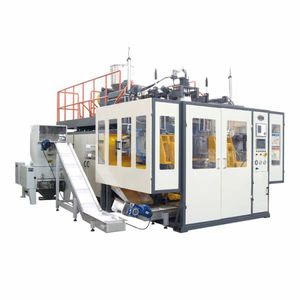Understanding Plastics Machinery: Common Types and Functions
Plastic machinery plays a pivotal role in our daily lives, as it is responsible for transforming raw plastic materials into a myriad of products we use regularly. From the packaging of our groceries to the components in our electronics, plastics processing machinery is the driving force behind it all. In this blog, we will explore the functions of plastic machinery and delve into the most common types used in the plastics industry.
Understanding the Role of Plastic Machinery
Plastic
machinery, also known as plastics
processing machinery, comprises a diverse range of equipment specifically
designed for molding, shaping, and processing plastic materials. These machines
are vital for the production of a wide array of products, offering versatility
and efficiency. Let's delve into what these machines do and the key roles they
play:
Injection Molding Machines:
What They Do: Injection molding machines are workhorses of the plastics industry. They operate by injecting molten plastic material into a mold, where it cools and solidifies, forming the desired product. This process is known for its precision and is suitable for manufacturing a broad range of products.
Common Applications:
Injection molding machines are used to create items like plastic containers,
automotive parts, medical devices, toys, and consumer goods.
Extrusion Machines:
What They Do: Extrusion machinery is primarily used for producing plastic products with a consistent cross-section. It involves melting plastic granules and forcing the material through a shaped die to create products such as pipes, tubes, and profiles.
Common Applications:
Extrusion machines are used in the production of plastic pipes, films,
sheeting, and various profiles for construction and automotive components.
Blow Molding Machines:
What They Do: Blow molding machines are essential for creating hollow plastic products, such as bottles, containers, and automotive fuel tanks. This process involves melting plastic and blowing it into a mold, giving it the desired shape as it cools.
Common Applications: The
beverage and packaging industries widely use blow molding machinery to produce
containers and bottles.
Thermoforming Machines:
What They Do: Thermoforming machinery is used to shape plastic sheets into specific forms by heating the material and molding it with a die. This technique is popular for creating disposable packaging and trays.
Common Applications:
Thermoforming is used to produce food containers, blister packs, and other
disposable packaging.
Rotational Molding Machines:
What They Do: Rotational molding, or rotomolding, is employed for creating large, hollow plastic products. The process involves rotating a mold while heating and cooling the plastic material inside, resulting in uniform thickness.
Common Applications:
Rotational molding is utilised for products like playground equipment, storage
tanks, and large containers.
Co-extrusion Machines:
What They Do: Co-extrusion machines allow for the combination of multiple plastic materials during the extrusion process. This enables the creation of products with different layers, each with distinct properties.
Common Applications:
Co-extrusion is commonly used in food packaging with barrier layers, multilayer
films for electronics, and multi-color profiles.
Plastic Welding Machines:
What They Do: Plastic welding machines are used to join plastic components by melting their surfaces and fusing them together. This is especially useful for repairing plastic parts or joining them in various industries.
Common Applications: Plastic
welding is applied in the automotive industry, construction, and the repair of
plastic products.
Mould Temperature Controllers:
What They Do: Mold temperature controllers are not directly involved in shaping plastic products but play a crucial role in maintaining precise mold temperatures during processes like injection molding. Consistent mold temperature ensures product quality and reduces cycle times.
Common Applications: Mold
temperature controllers are essential in injection molding and other processes
where maintaining consistent mold temperature is critical.
Plastic Recycling Machinery:
What They Do: Plastic recycling machinery is vital in the efforts to reduce plastic waste and promote the circular economy. These machines are designed to recycle used plastics into new products and involve processes like shredding, melting, and pelletizing.
Common Applications: Plastic
recycling machinery is crucial in reducing plastic waste and promoting
sustainability by creating new products from recycled materials.
Auxiliary Equipment:
What They Do: Beyond the core processing machines, various auxiliary equipment supports the plastics processing industry. This includes material handling equipment, granulators, conveyors, and quality control devices.
Common Applications: Auxiliary equipment is used to streamline the production process, reduce waste, and ensure product quality by supporting the main machinery.
Selecting the Right Machinery
Choosing the appropriate plastics processing machinery is a critical decision that affects the efficiency and cost-effectiveness of production. Several factors should be considered when selecting machinery:
Type of Plastic Material: Different plastics require specific processing techniques and machinery. The machinery used for polyethylene may not be suitable for processing polycarbonate.
Product Specifications: The desired product's size, shape, and complexity will influence the choice of machinery. Some machines are better suited for small, intricate parts, while others are ideal for large, hollow structures.
Production Volume: The volume of products to be manufactured is a key factor. Some machines are designed for high-volume production, while others are more suitable for lower quantities.
Budget Constraints:
Budgetary considerations play a significant role in machinery selection. The
cost of the machine, maintenance, and energy consumption all impact the overall
cost of production.
Conclusion
Plastic machinery is the backbone of the plastic industry, responsible for transforming raw plastic materials into the products that have become an integral part of our daily lives. Understanding the different types of plastics processing machinery and their applications is crucial for manufacturers, engineers, and anyone involved in the plastic industry. The plastics industry's commitment to innovation extends to packaging, where the integration of the world's fastest Automatic Bagging Machines has significantly improved the speed and precision of product packaging.
By staying
informed about the latest advancements and best practices, the industry can
continue to meet the evolving needs of a changing world while promoting
sustainability and innovation.

.png)

Comments
Post a Comment